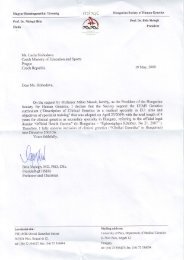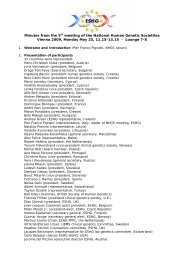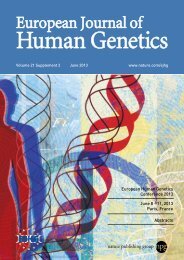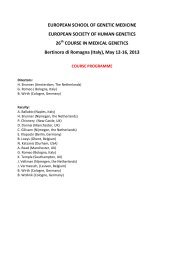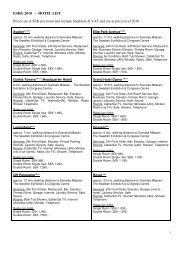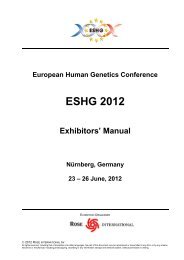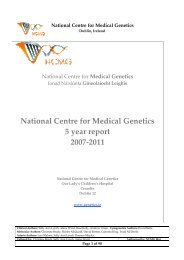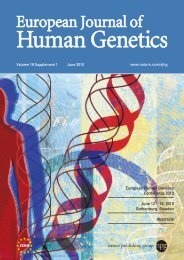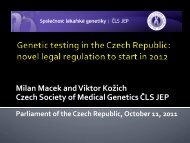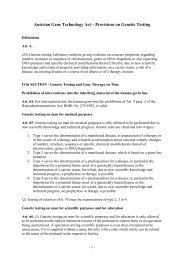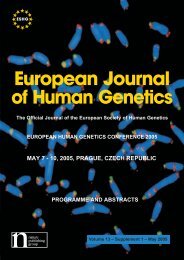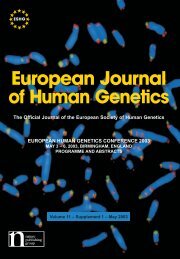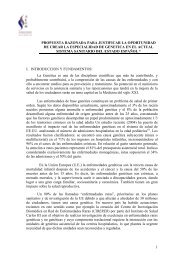2008 Barcelona - European Society of Human Genetics
2008 Barcelona - European Society of Human Genetics
2008 Barcelona - European Society of Human Genetics
You also want an ePaper? Increase the reach of your titles
YUMPU automatically turns print PDFs into web optimized ePapers that Google loves.
EMPAG Posters<br />
to optimize counseling service . We necessitate to analyze psychosocial<br />
features to fit counseling process to client personality and needs.<br />
To reach this goal, since 2004 we have evaluated needs for information,<br />
motivations and psychosocial characteristics <strong>of</strong> individuals asking<br />
for OGC because <strong>of</strong> their familial history <strong>of</strong> common cancers (breast,<br />
colon, thyroid, etc.). 110 counselees fulfilled a questionnaire before<br />
receiving OGC assessing: sociodemographic features, health locus <strong>of</strong><br />
control, monitoring/blunting, general self efficacy, motivations, emotional<br />
state and perceived risk . 76 were affected by cancer and 34<br />
were unaffected . Cancer risk was assessed either with genetic testing<br />
or with validated probabilistic models . Our results have showed that<br />
counselees have: no clinical psychological distress, high level <strong>of</strong> self<br />
efficacy but not a specific style <strong>of</strong> information seeking. They feel at high<br />
risk for cancer running in the family and they strongly want information<br />
about surveillance and prevention actions . Perceived risk is related to<br />
some psychological variables (coping and mood) and in unaffected<br />
people it is not related to cancer risk estimated . We can conclude that,<br />
individual seeking OGC have adaptive psychological resources that let<br />
them cope with familial cancer risk, and that evaluating psychological<br />
pr<strong>of</strong>ile has several implications into clinical practice, because psychological<br />
variables significantly influence risk perception.<br />
EP14.17<br />
triangulation <strong>of</strong> methods: a novel approach to investigating<br />
valued outcomes from using clinical genetics services<br />
M. McAllister 1 , K. Payne 2 , R. MacLeod 3 , D. Donnai 1 , L. Davies 2 ;<br />
1 Nowgen (A Centre for <strong>Genetics</strong> in Healthcare) & Medical <strong>Genetics</strong> Research<br />
Group, The University <strong>of</strong> Manchester, St Mary’s Hospital, Manchester, United<br />
Kingdom, 2 Nowgen (A Centre for <strong>Genetics</strong> in Healthcare) & Health Economics<br />
Research at Manchester, School <strong>of</strong> Community-based Medicine, The University<br />
<strong>of</strong> Manchester, Manchester, United Kingdom, 3 Medical <strong>Genetics</strong> Research<br />
Group, The University <strong>of</strong> Manchester, St Mary’s Hospital, Manchester, United<br />
Kingdom.<br />
The patient benefits from using clinical genetics services are hard to<br />
measure, and there is little consensus about appropriate outcome<br />
measures . This paper describes a programme <strong>of</strong> research that aimed<br />
to work towards a core set <strong>of</strong> outcome measures suitable for evaluating<br />
clinical genetics services . The approach involved 4 types <strong>of</strong> triangulation<br />
(method, investigator, discipline and data) . Three methods<br />
were used:<br />
(1) A systematic review <strong>of</strong> the literature identified the validated outcome<br />
measures (30 genetics-specific and 37 generic) used, or developed,<br />
to evaluate clinical genetics services .<br />
(2) A Delphi survey, aimed at identifying the degree <strong>of</strong> consensus<br />
about the relevance <strong>of</strong> existing outcome measures, was completed by<br />
a panel <strong>of</strong> 115 genetics clinicians and 72 patients <strong>of</strong> clinical genetics<br />
services . At least 75% <strong>of</strong> the panel agreed that the following outcome<br />
domains were useful: knowledge <strong>of</strong> the genetic condition, decisionmaking,<br />
perceived personal control, risk perception, satisfaction, meeting<br />
<strong>of</strong> expectations, coping, accuracy <strong>of</strong> diagnosis and quality <strong>of</strong> life .<br />
(3) Qualitative research (7 focus groups and 19 interviews) with patients<br />
<strong>of</strong> clinical genetics services, patient representatives and genetics<br />
health pr<strong>of</strong>essionals explored the outcomes valued by those stakeholders,<br />
and resulted in construction <strong>of</strong> a model <strong>of</strong> empowerment .<br />
Data triangulation clarified that the qualitative findings support many <strong>of</strong><br />
those from the Delphi, but identified some additional valued outcome<br />
domains that are not captured by available outcome measures, such<br />
as empowerment <strong>of</strong> other relatives and future generations . In conclusion,<br />
triangulation is a useful approach to investigate complex areas,<br />
such as outcome measurement .<br />
EP14.18<br />
Psychological evaluation <strong>of</strong> familial ovarian cancer screening<br />
(PsyFOcs): study update and baseline psychological data<br />
D. Lancastle 1 , K. Brain 1 , L. Fraser 2 , U. Menon 2 , A. Rosenthal 2 , I. Jacobs 2 , J.<br />
Mackay 2 , R. Iredale 1 , C. Phelps 1 , M. Rogers 1 , J. Austoker 3 , C. Bankhead 3 , A.<br />
Clements 3 , E. Watson 4 ;<br />
1 School <strong>of</strong> Medicine, Cardiff, United Kingdom, 2 Gynaecological Oncology, Institute<br />
for Women’s Health, UCL, London, United Kingdom, 3 Primary Care Research<br />
Education Group, Oxford, United Kingdom, 4 School <strong>of</strong> Health and Social<br />
Care, Oxford Brookes University, Oxford, United Kingdom.<br />
Purpose: The UK Familial Ovarian Cancer Screening Study (UK FO-<br />
CSS) aims to determine the effectiveness <strong>of</strong> ovarian cancer screen-<br />
ing for women at significantly increased risk <strong>of</strong> familial ovarian cancer.<br />
Phase 2 <strong>of</strong> the study involves annual transvaginal ultrasound scan<br />
(TVS) <strong>of</strong> the ovaries and 4-monthly CA125 blood tests with further<br />
tests prompted by rising CA125 or abnormal TVS .<br />
Method: PsyFOCS is a prospective cohort study which aims to determine<br />
the psychological effects <strong>of</strong> ovarian cancer screening . Around<br />
66% <strong>of</strong> women invited to PsyFOCS returned pre-screening baseline<br />
questionnaires .<br />
Results: Baseline analyses (N=991) showed that clinical levels <strong>of</strong><br />
depression and anxiety were reported by 2 .63% (n=26) and 14 .63%<br />
(n=145) <strong>of</strong> women respectively . However, over a third (n=369, 37 .24%)<br />
were moderately or highly distressed about their ovarian cancer risk<br />
according to the Impact <strong>of</strong> Event Scale (IES). There were no significant<br />
associations between IES distress and prior ovarian TVS (p= .50) or<br />
the number (p= .95) or reported stressfulness (p= .56) <strong>of</strong> repeat ovarian<br />
cancer screening in the past . However, highly distressed women were<br />
significantly younger than those reporting moderate or low distress<br />
(p



